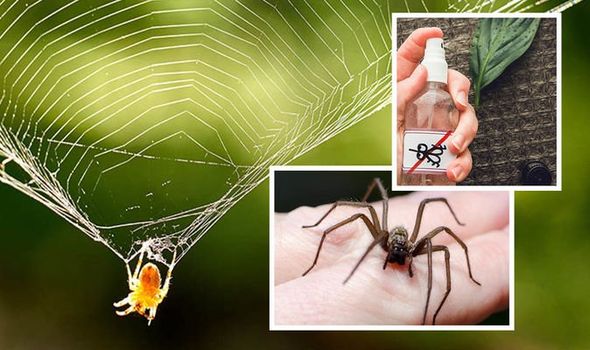Ammonia can kill spiders effectively and efficiently. Due to its toxic properties, it is a potent and popular solution for spider control in households and extermination purposes.
Additionally, ammonia is easily accessible and cost-effective, making it a go-to option for many people. Spiders are commonly found in homes, gardens, and other areas, and while they are beneficial for controlling pests like mosquitoes and flies, their presence can be unsettling for some individuals.
Therefore, many look for methods to eliminate spiders without commercial pesticides. Ammonia, a colorless gas with a strong, pungent odor, can be an effective solution. When exposed to ammonia, spiders experience respiratory distress, leading to their death. It acts as a respiratory irritant, damaging their delicate respiratory system and suffocating them.
This makes ammonia a powerful tool for eliminating spiders from your surroundings. It is important to note that while ammonia can help in spider control, it may not be a permanent solution. Regular cleaning, reducing clutter, and sealing entry points will prevent spiders from reinfesting.
Understanding The Impact Of Ammonia On Spiders
Ammonia is a powerful substance that can have a significant impact on spiders. Understanding its properties is critical to assessing its effectiveness as a spider extermination solution. Ammonia, with a strong odor and a transparent color, is a gas composed of three hydrogen atoms bonded to a nitrogen atom. Its pungent smell is often associated with cleaning products and household cleaners.
When exposed to ammonia, spiders can experience adverse effects. Ammonia is toxic to spiders and can lead to their demise if they contact it directly. It interferes with their respiratory system and can cause damage to their exoskeleton. However, it’s important to note that while ammonia can effectively kill spiders, it may not eliminate an infestation. Spiders are resilient creatures; using ammonia alone may not eradicate the problem.
Ultimately, the effectiveness of ammonia as a spider extermination solution may vary depending on the severity of the infestation and the species of spiders involved. It’s recommended to consult with professionals or use alternative pest control methods with ammonia for more effective results.
The Science Behind Ammonia’s Effect On Spiders
Ammonia is a potent alkaline compound commonly found in cleaning products and fertilizers. When exposed to spiders, ammonia can significantly impact their respiratory systems. This effect is due to the strong reaction between ammonia and the spider’s exoskeleton, which contains chitin.
Chitin is a rigid and flexible material that forms the spider’s outer shell and supports their internal organs. When ammonia comes into contact with chitin, it causes the breakdown of the compound, leading to damage and weakening of the exoskeleton. This disruption impairs the spider’s ability to breathe and eventually results in its death.
Understanding how ammonia disrupts spider respiratory systems:
Spiders breathe through tubes called tracheae, which are found throughout their bodies. These tracheae connect to small openings called spiracles on the surface of the spider. As spiders inhale, air enters the spiracles and travels through the tracheae, oxygenating their tissues. When ammonia is present in the environment, spiders can inhale it, and the toxic fumes can damage the delicate inner linings of their tracheae. This damage reduces the spider’s ability to extract oxygen, leading to suffocation and eventual death.
Exploring the potential long-term effects of ammonia exposure on spiders:
Exposure to ammonia over extended periods can have lasting effects on spider populations. Aside from immediate respiratory damage, prolonged ammonia exposure can weaken spiders’ overall health and immune systems. This weakened state makes them more vulnerable to infections, diseases, and predators, ultimately impacting their survival and reproduction.
Furthermore, ammonia can also contaminate the spiders’ environment, decreasing available prey and further harming their population. It is essential to consider the potential long-term consequences of ammonia use on spiders and to find alternative methods of pest control that minimize harm to these beneficial creatures.
Implementing Ammonia As A Spider Extermination Solution
Ammonia can effectively exterminate spiders due to its toxic properties, making it a viable spider removal solution. Its ability to kill spiders quickly and efficiently makes it an appealing option for those with arachnid infestations.
| Proper application techniques for using ammonia to eliminate spiders |
|---|
| When using ammonia as a spider extermination solution, following appropriate application techniques for optimal results is essential. Here are a few considerations: |
| • Identifying the ideal ammonia concentrations for maximum effectiveness: Start by diluting ammonia with water to create a mixture. The excellent ammonia concentration for killing spiders is around 5-10%. Higher concentrations may be harmful to humans and pets, so it is crucial to follow safety guidelines. |
| • Safety precautions and considerations when using ammonia to kill spiders: Always wear protective gloves and a mask when handling ammonia to protect yourself from potential respiratory and skin irritations. Ensure proper ventilation in the treated area, as ammonia has a strong odor. Avoid using ammonia in areas where it may come into contact with food or water sources. Keep children and pets away from treated areas until the ammonia completely evaporates. |
Comparing Ammonia To Other Spider Extermination Methods
Ammonia can be an effective method for killing spiders, but evaluating its pros and cons is crucial compared to other commonly used spider extermination methods.
| Evaluation Factors | Ammonia | Natural Repellents |
|---|---|---|
| Effectiveness | Ammonia has proven effective in repelling spiders and can kill them on contact. Its strong smell is a deterrent and can discourage spiders from entering your space. | Natural repellents, such as essential oils or vinegar, can also be effective in repelling spiders, but their potency may vary. They may not be as powerful as ammonia in killing spiders. |
| Cost-efficiency and Accessibility | Ammonia is widely available and relatively inexpensive, making it accessible to most people. It can be easily found in stores or purchased online. | Natural repellents are often more expensive than ammonia and may require additional effort to source. However, they are usually considered safer for indoor use and are more environmentally friendly. |
Considering its effectiveness and accessibility, ammonia can be a suitable option for spider extermination. However, individuals concerned about using chemical-based solutions may prefer natural repellents despite their potential limitations in effectiveness and cost. Ultimately, the choice between ammonia and natural repellents depends on personal preferences and the situation.
Debunking Myths And Misconceptions About Ammonia And Spider Extermination
Addressing common misconceptions about the use of ammonia against spiders
Ammonia has long been speculated as an effective method for spider control, but it is essential to separate fact from fiction. Some believe that ammonia can kill spiders, while others argue it is merely a deterrent. Let’s clarify some potential risks and dangers of using ammonia as an extermination method.
While ammonia has a pungent odor that may repel spiders, it is not known to be lethal. Furthermore, little scientific evidence supports its efficacy as a long-term spider control solution. It’s essential to understand that spiders serve a purpose in the ecosystem as they help control other pests. Instead of relying solely on ammonia, it is advised to adopt holistic approaches such as sealing entry points or using sticky traps to manage spider populations effectively.
Busting myths surrounding the effectiveness of ammonia for spider control
Contrary to popular belief, ammonia is not a panacea for spider extermination. While it may make spiders temporarily avoid the treated areas due to its strong smell, it does not provide a lasting solution. Furthermore, ammonia can be harmful if not used properly. If inhaled in high concentrations, it can cause skin irritation, eye damage, and respiratory issues.
Handling ammonia cautiously and following safety guidelines for pest control is crucial. Instead of relying solely on ammonia, it is recommended to employ integrated pest management techniques. This includes maintaining cleanliness, removing clutter, and minimizing spider habitats to prevent infestations in the first place.

Credit: www.reddit.com
Tips And Tricks For Successful Spider Extermination With Ammonia
Using ammonia as a spider extermination method can be an effective and affordable solution. However, it is essential to follow best practices to ensure success. When targeting specific spider species, identify the type of spiders in your infested area to determine the most effective ammonia-based solution.
For example, mixing ammonia with water and spraying it around cracks and crevices can help eliminate cellar spiders. To prevent future spider infestations, maintain cleanliness in your home by regularly dusting and vacuuming to remove spider webs and eggs.
Additionally, implementing preventive measures such as sealing gaps and cracks, using spider repellents, and keeping outdoor lights off can reduce the likelihood of spiders entering your home. By following these tips and tricks, you can successfully eradicate spiders using ammonia and minimize the chances of future infestations.
Conclusion
Ammonia may indeed be effective in killing spiders due to its toxic properties. However, it is essential to exercise caution when using ammonia as a spider repellent, as it can also harm humans and pets. It is always recommended to consult with professionals for safe and effective spider control methods.
Maintaining a clean and clutter-free environment is critical to keeping spiders at bay.
